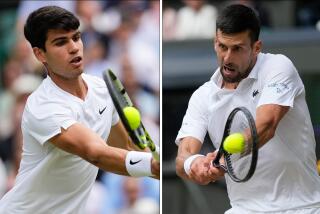WIMBLEDON : NOT BJORN AGAIN : Edberg’s Game Isn’t Typical of Swedes, but His Results Are
- Share via
WIMBLEDON, England — Seventeen years ago in Vastervik, Sweden, the parents of a 6-year-old boy who liked ice hockey and soccer saw a newspaper advertisement about a tennis facility. They decided they would like their son to try tennis and he agreed.
The youngster went once a week for a year, but he wasn’t always thrilled with the sport and thought about quitting more than once. His mom and dad urged him to stick with it, though, and eventually he started to enjoy tennis.
He began to hit tennis balls against a wall near his home for hours when he was away from the court, and he took tennis balls to bed with him.
Not yet 8 years old, he became a regular at the small tennis club that had two clay courts and one indoor court, but no clubhouse. They let him play free. He competed in a lot of summer tournaments. Since the boy was the youngest at the club, he always played against older players and that accelerated his progress.
By the time he was 11, he was unseeded in his first big junior tournament, but he won.
“Nobody knew who I was,” said Stefan Edberg.
Those times seem to be a comfortable memory when Edberg summons them to the conversation these days. At 23, he is ranked No. 3 in the world and the defending champion of the most famous tennis tournament in the world--Wimbledon. But when he was banging those tennis balls off that wall in Vastervik, Edberg didn’t once wonder if he would win at Wimbledon, or even what his future might be in his chosen career.
“You never thought about that when you were young,” Edberg said. “When I got up to 15, 16, then you start to think about becoming professional. Mats Wilander won the French when he was 17. Then you realized you weren’t that far behind him so you thought ‘Maybe I’ve got a chance, too.’ ”
His biggest chance arose last July. At the All England Lawn Tennis and Croquet Club, he mowed down Boris Becker in a rain-delayed final for the one Grand Slam title that means more than any other.
“Every tennis player that’s ever picked up a racket has always wanted to win Wimbledon,” said Tony Picard, Edberg’s coach.
It was a victory that probably made Edberg’s career. Two Australian Open titles notwithstanding, winning Wimbledon is a lifetime achievement for any player, but it is also not without its risks. Pat Cash of Australia won two years ago, only to fall victim to poor health and a sinking career. Becker won twice the two years before that and has been continually tormented by the specter of failing to win a third.
For Edberg, victory seems to have meant something different.
“I never really dreamt about being a big star,” he said.
His father is still a policeman in Vastervik and his mother still works with the disabled. Although Edberg moved from his hometown to London, he said his personality is where it has always been.
“There’s no need for me to change,” he said. “There is no point painting up a different personality. I am the person I am. I am comfortable with that. You could behave like a big star and you really could make people walk in that direction for you. Really paint a different picture. I don’t believe that’s any good for me.”
Neither has the personality of Edberg’s game changed, one that is altogether different from the normal Swedish tradition of hitting from the baseline. From Bjorn Borg to Mats Wilander to Kent Carlsson, the baseline has always been home.
Edberg, however, felt different. Legendary Swedish Coach Percy Rosberg decided that Edberg had the natural ability to serve and volley, so he moved Edberg from the baseline to the net. Picard, who refined Edberg’s game, said it didn’t take a genius to see that a change in tactics was warranted.
“He’s fortunate to have a big serve, but we’ve also improved his movements on the court tremendously, made him so much quicker,” Picard said. “And with that kind of game that he was able to play, it was nonsense to play the back of the court. Yeah, he’s un-Swedish if you like.”
After winning Wimbledon last year, Edberg’s results began to fall off, but he began the year with a good start in Australia, athough he had to default to Thomas Muster of Austria in the quarterfinals because of a back injury. Two weeks ago, Edberg got to the final of the French Open, but lost to Michael Chang of Placentia in five sets.
But in Wilander’s opinion, Edberg could win Wimbledon again this year because of his new-found mental superiority.
“What happened to him, I think, is the same that happened to me,” Wilander said. “For me, to become the world No. 1., it was great, but it was also a relief. I think for him to win Wimbledon, which is where he was aiming, I think he’s kind of relieved he has done it.
“He’s proved to himself that he could win the biggest tournament in the world and I think he’s proved to a lot of people who were doubting that he had the ability and the mental capacity to win a tournament like that.
“So I think he was kind of relieved that he won and I think that’s kind of the reason he didn’t play well after that. Now he’s picking up his motivation.
“Wimbledon, it’s such a big thing for everybody that hasn’t won it,” Wilander said. “That’s the way I feel. When you haven’t won it, you pass that edge of thinking you can’t win it because it’s Wimbledon. I think that’s what I’m thinking a little bit. That’s what you know about tennis. Wimbledon.
“For him, now, he’s done it. I think now he realizes that winning that tournament is not as big a thing as everybody thinks it is. It’s huge, but it’s not impossible. In a way, in his mind, I think it’s maybe the easiest tournament to win because he has that mental edge.”
Edberg remembers watching television as Borg won Wimbledon five consecutive years, from 1976-1980. Eight years later, Edberg won. Wilander, who won his first Grand Slam title at 17, won three more last year and became the first Swede to be ranked No. 1 since Borg.
But if there is one tournament that Edberg would like to win more than any other, it would be Wimbledon, again.
“That is my No. 1 choice,” Edberg said. “The whole environment. The whole tradition. And I like playing on grass as well. I was brought up watching Borg playing all those Wimbledon finals. And that’s the one like the most--and want the most.”
Wilander said if there are any doubters about Edberg’s stature, all Edberg has to do is . . .
“Win Wimbledon or the U. S. Open, which is where I think he has his best chance, then he has definitely proved his point,” Wilander said. “He’s still at the beginning of his career. He knows, or at least I know, he’s going to win Wimbledon at least two or three more times because of the way he plays.
“I hope he’s not worried. I think if he wins it again, then he doesn’t have to worry about anybody anymore. He can just worry about himself.”
More to Read
Go beyond the scoreboard
Get the latest on L.A.'s teams in the daily Sports Report newsletter.
You may occasionally receive promotional content from the Los Angeles Times.










